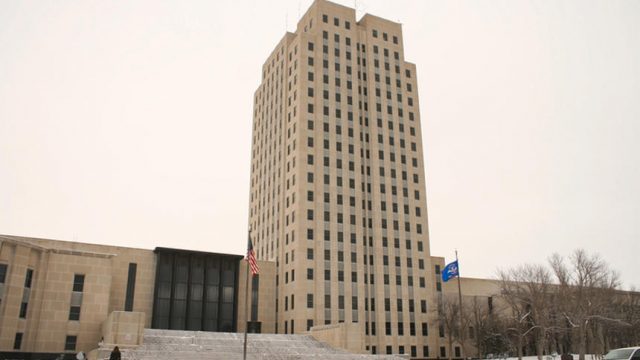Number of Lobbyists Working North Dakota Legislature on a Downward Trend Over the Last Decade

ND State Capitol (Korrie Wenzel/Grand Forks Herald)
Lawmakers are taking a break the first part of this week for crossover, the midway point of the legislative session when the House sends the Senate the bills they’ve passed and vice versa.
So far lawmakers have gaveled in for 36 of the maximum 80 legislative days they’re allotted by the state constitution. They’re making good time, but some tough issues loom in the second half not the least of which is the budget situation.
But as lawmakers take some well-earned time off, Secretary of State Al Jaeger updates us on the lobbying situation. Lobbyists who wish to work in the state must register first with Jaeger’s office. This morning Jaeger sent out a release to the media showing the number of lobbyists, and the number of organizations represented by lobbyists, currently registered to work versus the same data going all the way back to 2006.
I put that information into graph form, and what we see is a decline in the number of lobbyists working at the Legislature:
Keep in mind that the registration cycle runs from July 1 through June 30 the next year.
There are a couple of interesting takeaways from the data.
First, the state’s oil boom didn’t have nearly the impact on lobbying as you might have expected. Most observers – including this one – would have expected record-setting lobbying efforts amid those years of record-setting revenue numbers – but it didn’t really happen. Sure there was a slight increase in the number of lobbyists working in the 2012-2015 years, and a bigger increase in the number of organizations represented, but in context these are aberrations in what is an overall downward trend.
[mks_pullquote align=”right” width=”300″ size=”24″ bg_color=”#ffffff” txt_color=”#000000″]Given that a) North Dakota’s lawmakers are very, very accessible – they often list their home addresses and even cell phone numbers in their legislative bios – and b) the goings-on in Bismarck are easier to track than ever the need for professional lobbying is diminished.[/mks_pullquote]
Second, that downward trend is pretty interesting. I’ve been thinking why this would be the case, and the only explanation I can come up with is technology.
Lobbyists are hired to track public policy and help shape it on behalf of their clients. But with the advent of technology – everything from email and social media to the state’s bill tracking service and online video broadcasts of floor debates – doing that sort of thing is easier than ever for the average citizen.
Members of the public contacting lawmakers on their own behalf do not have to register as lobbyists. Given that a) North Dakota’s lawmakers are very, very accessible – they often list their home addresses and even cell phone numbers in their legislative bios – and b) the goings-on in Bismarck are easier to track than ever the need for professional lobbying is diminished.
Were North Dakota a more populous state, a place where elected leaders had staffers and other buffers between themselves and the public, this might not be the case.
A former lawmaker once told me a story about attending a conference with elected leaders from other states which had him leaving a room in shock when he announced that not only to North Dakota lawmakers not have any staff, they don’t even have offices in the capitol.
It’s fashionable these days, mostly among rank partisans and/or the lightly informed, to look down one’s nose at our Legislature. To suggest that they don’t do a good job of representing the will of the people. But I’d argue that North Dakota’s state assembly is perhaps closer to the people than any legislature in another state.





